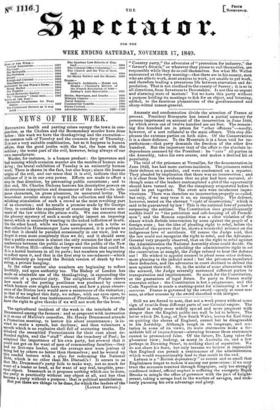Amnesty and condemnation divide the attention of France at present.
President Bonaparte has issued a partial amnesty for persons imprisoned on account of the insurrection in June 1848, by which seven out of twelve hundred are set free. The remain- ing five hundred are in prison for " other offences"—mostly, however, of a sort collateral to the main offence. This step dis- pleases the extreme parties on both sides. Of the Conservatives it is a sheer defiance. To the Mountain it is a boon void for im- perfectness—that party demands the freedom of the other five hundred. But the important trait of the affair is the absolute in- dependence assumed by the President : he " cuts " all parties in the Assembly, takes his own course, and makes a decided hit at popularity. The trial of the prisoners at Versailles, for the demonstration in June 1849, has had more curious incidents. The prisoners rested their defence on a paradox, and were condemned on a repartee. They pleaded by implication that there was no insurrection ; and it is clear from the evidence that no plot had been matured, al- though some of the leaders contemplated a plot if the opportunity should have turned up. But the conspiracy evaporated before it could be put together. The overt acts were incoherent impro- visations. There was therefore no insurrection properly so-called, but only, if we may term it so, an insurgibility. The defence, however, rested on the abstract "right of insurrection," which is said to be guaranteed by law I This is the national love of paradox surpassing the sublime. The Constitution does grandiloquently confide itself to "the patriotism and safe-keeping of all French- men"; and the Roman expedition was a clear violation of the clause which forbids intervention by arms against the people of a foreign state ; but the idea of pleading right to rebel, before the tribunal of the powers that be, shows a wonderful reliance on the indigenous love of antithesis. Of course the Judge said, that the law could not recognize the right to rebel, and the Advocate. General very properly observed, that on the right to rebel against the Administration the National Assembly alone could decide. On which duplex repartee, upholding the administrative right to set the constitution at nought, the Judge refused to hear the defence out ! He wished to appoint counsel to plead some other defence, more pleasing to the judicial mind : but the prisoners repudiated their defenders, and the advocates in court declined to defend the men against their will. So, in the midst of some altercation with the accused, the Judge severally sentenced different parties to transportation and imprisonment. So much for the Constitution, or the guarantees of legal forms. No party in France really venerates either : the Constitution is but a programme, and the Code Napoleon is made a starting-point for eliminating a law a con verso. France is governed by the sword—openly at some sea- sons, at other seasons by the sword sheathed with intrigue.


























